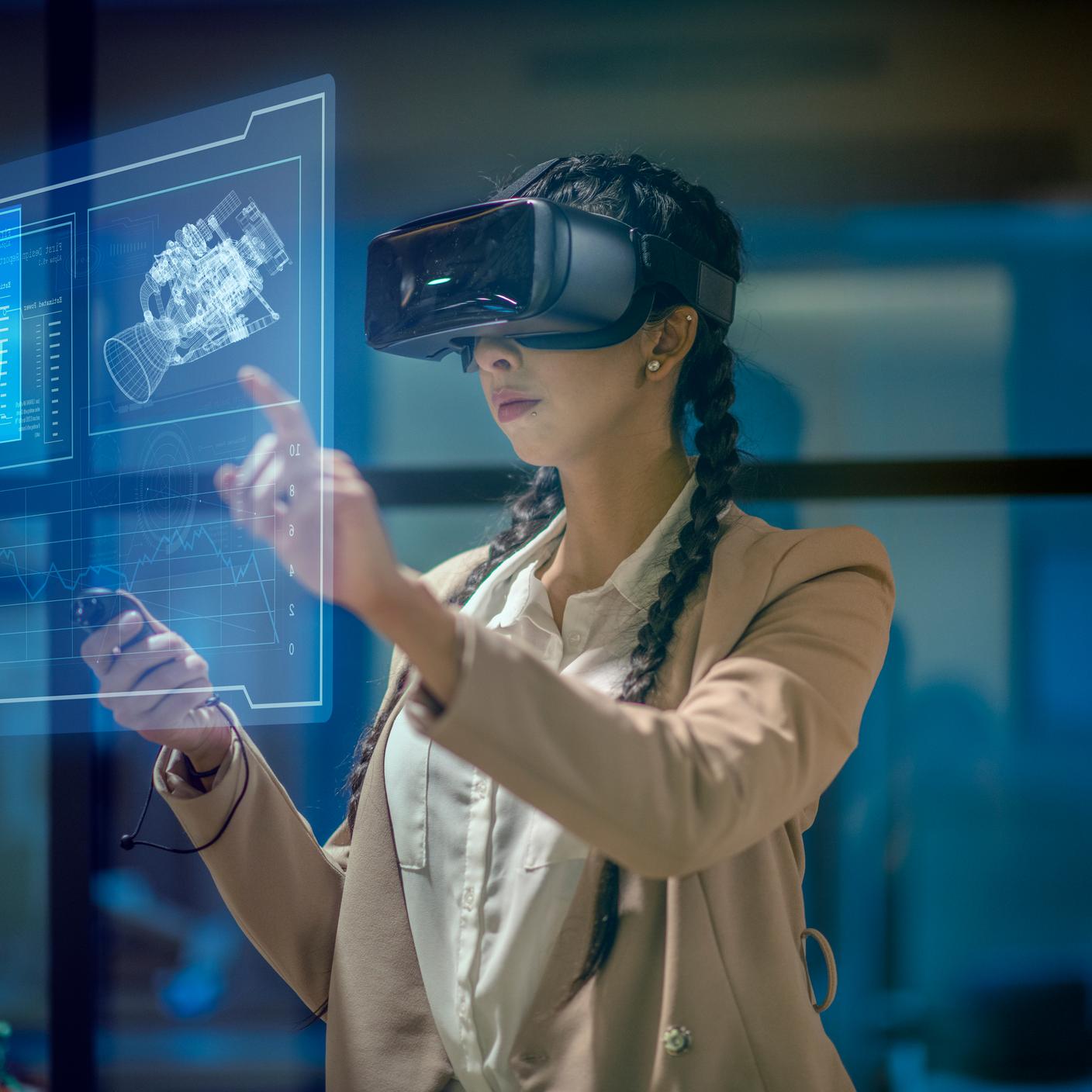BSI have proudly partnered with the Foodservice Equipment Association on this latest blog, combining our expertise to address the most pressing challenges and opportunities for sustainable sector progress.
Artificial Intelligence (AI) is reshaping how the food supply chain operates. What was once complex and reactive is becoming more connected, efficient, and data-driven. Farmers are using AI to monitor soil conditions and improve yields. Restaurants are modelling consumer preferences and creating personalised experiences. In just four years, the AI-driven food tech market is expected to reach a staggering $27.73 billion (£20.69 billion). The way we grow, manage, and serve food will continue to change.
The foodservice equipment sector is no exception. As technologies evolve rapidly, applications in the industry are expanding, helping manufacturers and their customers to improve food quality, streamline operations, and reduce costs. BSI’s research reveals that more than three in five professionals globally believe that AI has delivered tangible benefits to the food sector in the last six months (64 per cent) and that it can help solve key challenges (61 per cent). For business leaders, the advantages of AI are clear. Not only does it create efficiencies, but it also helps manufacturers to differentiate products in a competitive market. Almost half say it has helped to boost revenues by up to 20 per cent. [1]
Still, this new era brings challenges. For many, navigating the pace of technological change, understanding its impacts, and addressing ethical concerns can feel overwhelming. In the UK, just 42 per cent of people say they are willing to trust AI, while 78 per cent are concerned about negative outcomes. At the same time, three quarters of US executives worry their company will fail if they do not implement AI effectively in the next five years. There is a sense of urgency and uncertainty.
But businesses should not be discouraged; innovation has the potential to change the industry for the better. By approaching what they are doing with an AI mindset now, organizations have an opportunity to help shape this transformation. They can deliver progress across the supply chain and lay the foundations for long-term success.
Unlocking opportunities
From analysing consumer trends to improving demand forecasting, AI-driven opportunities within the foodservice industry are vast. On the extreme end of the scale, kitchens are using robots to automate food preparation tasks, such as flipping burgers. But there are also simpler, more immediate advances that can enhance the performance of current equipment.
In any foodservice environment, equipment must maintain precise controls to ensure quality and safety. This is where AI is beginning to play an important role. It is bringing smarter systems that respond in real time to changing conditions and operational demands.
For example, Internet of Things (IoT) sensors embedded into equipment can monitor temperatures as well as key quality indicators like free fatty acid content in oils. These will alert operators if thresholds are breached, ensuring optimal conditions are maintained. Smart fridges might employ optical sensors to identify misplaced food and avoid problems like cross-contamination.
Sensors collect data too. AI-analysis can provide insights into trends, from fluctuations in energy use to performance inconsistencies, helping to reduce costs and waste, at the same time boosting the quality of food being served. After developing a system to transform manufactured or already-installed equipment into smart devices, an Italian beverage equipment company reported a 27 per cent improvement in draught quality among its customers, thanks to enhanced monitoring of factors including sanitation, product shelf life, and temperature.
Another valuable application is predictive maintenance. By analysing performance data from IoT devices, AI can predict when critical components are likely to fail – before they actually do. This not only prevents costly breakdowns and downtime but also extends equipment lifespan. Operators can get further peace-of-mind by accessing the FEA’s Accredited Service Providers, benefiting from preventative maintenance programmes and breakdown cover to ensure they are fully supported should anything go wrong.
The implications of these technologies are significant because they benefit the end-consumer. For example, using AI systems to detect potential safety hazards, such as incorrect temperatures or contamination risks, prevents food spoilage and avoids people from becoming ill. As efficiency and productivity gains ensure more consistent food quality and shorter wait times, enhancing the overall consumer experience.
Smarter equipment can be better for the environment too. AI devices enable businesses to monitor their energy consumption more effectively, while precision cooking helps to minimize food loss and waste. This is just the start. From supply chain audits to increased equipment lifespan, AI will play a central role in driving smarter, more responsible operations - something that will be explored further in an upcoming article.
The opportunities seem endless. But, for companies looking to get ahead, reviewing existing equipment to support emerging capabilities is a great place to begin. Success will demand agility and flexibility: an ambidextrous approach that optimises for today while innovating for tomorrow.
Taking a hybrid approach
As AI technologies become increasingly integrated, organizations should expect and plan for some resistance to change. Many people are anxious about the impact of AI on their job, and this is not without grounds. According to some reports, almost eight million UK jobs could be lost to AI. Others predict that, as soon as 2030, 60 per cent of US jobs could be significantly altered by the technology. While these concerns are valid, AI has the potential to enhance how people work, therefore, for businesses to overcome resistance to change and fully leverage AI, adopting a human-AI hybrid model is the most effective strategy.
AI is best placed to handle repetitive, data-heavy, and time-consuming tasks, like inventory tracking, releasing people to devote more time to higher-value activities. Strategic decision-making, creative problem-solving, and relationship management are all areas where human judgment, experience, and emotional intelligence are vital.
It is important to remember that AI is not infallible. It can sometimes ‘hallucinate’ producing outputs that are on the one hand believable, but on the other inaccurate or misleading. This idiosyncrasy underscores the need for human oversight and contextual understanding. In an industry where precision, safety and compliance are paramount, people remain essential for validating outputs, identifying anomalies, and making nuanced decisions that AI alone cannot.
History teaches us that technological progress delivers the most impact when accompanied by foresight, regulation, and ethical considerations. [2] It is crucial not to lose sight of ethics and ISO/IEC 42000 provides a comprehensive framework for the ethical development, deployment, and governance of AI systems. Alongside other principles, it recommends that organizations establish clear lines of accountability, making sure there is a responsible party for AI-driven decisions and their outcomes. In other words, the industry needs humans-in-the-loop to establish guardrails around these new technologies, ensuring that they align with existing standards like ISO 22000 for food safety management and that they are being consistently followed.
With all this in mind, it is essential that organizations bring whole teams along on their AI journey. It is not enough for these conversations to be had in the boardroom among a select few. Lasting, constructive change will only come if everyone feels comfortable and engages with the opportunities AI provides. This starts with transparency, clearly communicating what new technologies will support and what they will not replace. It also means investing in training to build employees’ literacy and confidence in working alongside AI tools.
Change can be uncomfortable. The most successful organizations in this time of transformation will be those that strike a balance: leveraging AI for operational enhancements, efficiency and insight, while empowering people to take the lead, adapt and contribute to a culture of innovation.
Taking the first steps
With so much potential, tempered with very human concerns, implementing AI can feel overwhelming. However, there are some practical first steps organizations can take to help make sure innovation is aligned with real business needs.
Start with a clear business use case
Before doing anything else, it is essential to identify a specific business challenge or opportunity that AI can help address. Whether this is improving the reliability of equipment, optimizing inventory management or reducing food waste, understanding the desired outcome helps ensure that AI is applied with purpose, not just novelty.
Look for accessible, off-the-shelf solutions
There are now many cloud-based platforms which can integrate seamlessly with existing systems. These provide access to advanced AI without the need for costly hardware.[3] For equipment manufacturers, adding IoT sensors to their products is a valuable entry point. These solutions are maintained and often scalable, allowing for continuous improvement as technology develops and business needs evolve. Seeking platforms that have been independently assessed can help with selecting a reputable provider.
Bring in the right expertise
AI implementation is not just a technical project – it is a strategic one. Engaging external experts can enable businesses to navigate the complexities of integration, from selecting the right tools to identifying the areas where it can deliver the greatest value. BSI partners with clients to assess AI algorithms for their utility, purpose, and ethical implications, providing best practice support on the use of new technologies.
Prioritise cybersecurity
For all its benefits, AI has enabled more sophisticated forms of cyberattacks. And, as organizations collect and analyse more data using AI, they can become more vulnerable. Many continue to operate on unsupported legacy systems, creating a significant challenge, but cybersecurity risks are not ones that business can afford to ignore. It is important to ensure systems are maintained and kept up to date, layering robust security measures over AI systems to safeguard sensitive data. AI regulation is still in its infancy, but ISO/IEC 42000 provides a valuable roadmap here.
Pilot, test, and refine
Running small-scale pilots of AI-enhanced products enables teams to test functionality, gather customer and staff feedback, and make incremental improvements before scaling up. An ambidextrous approach, balancing day-to-day operations with this process of agile experimentation, reduces risk, while encouraging innovation and continuous learning.
We are at the beginning of a new and exciting industrial revolution. The time has come for industry to embrace an AI-mindset, take that first step – no matter how small - and contribute to the transformation that will reshape food service, food manufacturing and their supply chains for the better.
Collaboration, coupled with industry-wide standards, will be critical to driving excellence and building trust in the face of emerging challenges. This is why the FEA and BSI are working together. By engaging with the FEA, organizations can stay ahead of evolving regulation, innovation and customer needs – benefiting from shared insights, active forums, and expert knowledge across the network. BSI is helping to build these cultures of compliance and continuous improvement. With tailored guidance, training and certification, it empowers its partners not just to meet standards, but to lead the way, embedding quality and resilience.
Shape your future by adopting an AI-mindset with the support of the FEA and BSI.
About Foodservice Equipment Association (FEA)
The Foodservice Equipment Association (FEA) is the foremost foodservice sector membership association within the United Kingdom. FEA stands to influence, inform, and involve the entire UK foodservice equipment supply chain, ensuring that their members benefit from the highest-levels of representation in the UK, Europe, and globally.
FEA's membership encompasses the full spectrum of entities involved in the foodservice equipment industry. This includes manufacturers, importers, distributors of both light and heavy equipment, and service providers.
For more information about the FEA please visit FEA.org.uk.
About BSI
BSI is a business improvement and standards company and for over a century BSI has been recognized for having a positive impact on organizations and society, building trust and enhancing lives. Today BSI partners with more than 77,500 clients in 195 countries and engages with a 15,000 strong global community of experts, industry and consumer groups, organizations and governments.
BSI provides organizations with the confidence to grow by partnering with them to tackle society’s critical issues – from climate change to building trust in digital transformation and everything in between - to accelerate progress towards a fair society and a sustainable world.
[1] Eliftech: AI in Supply Chain: Enhance Efficiency with Ease
[2] BSI: How Lessons from the Past can Help us Navigate the Digital Revolution
[3] Computer Weekly: AI and cloud: The perfect pair to scale your business in 2025







